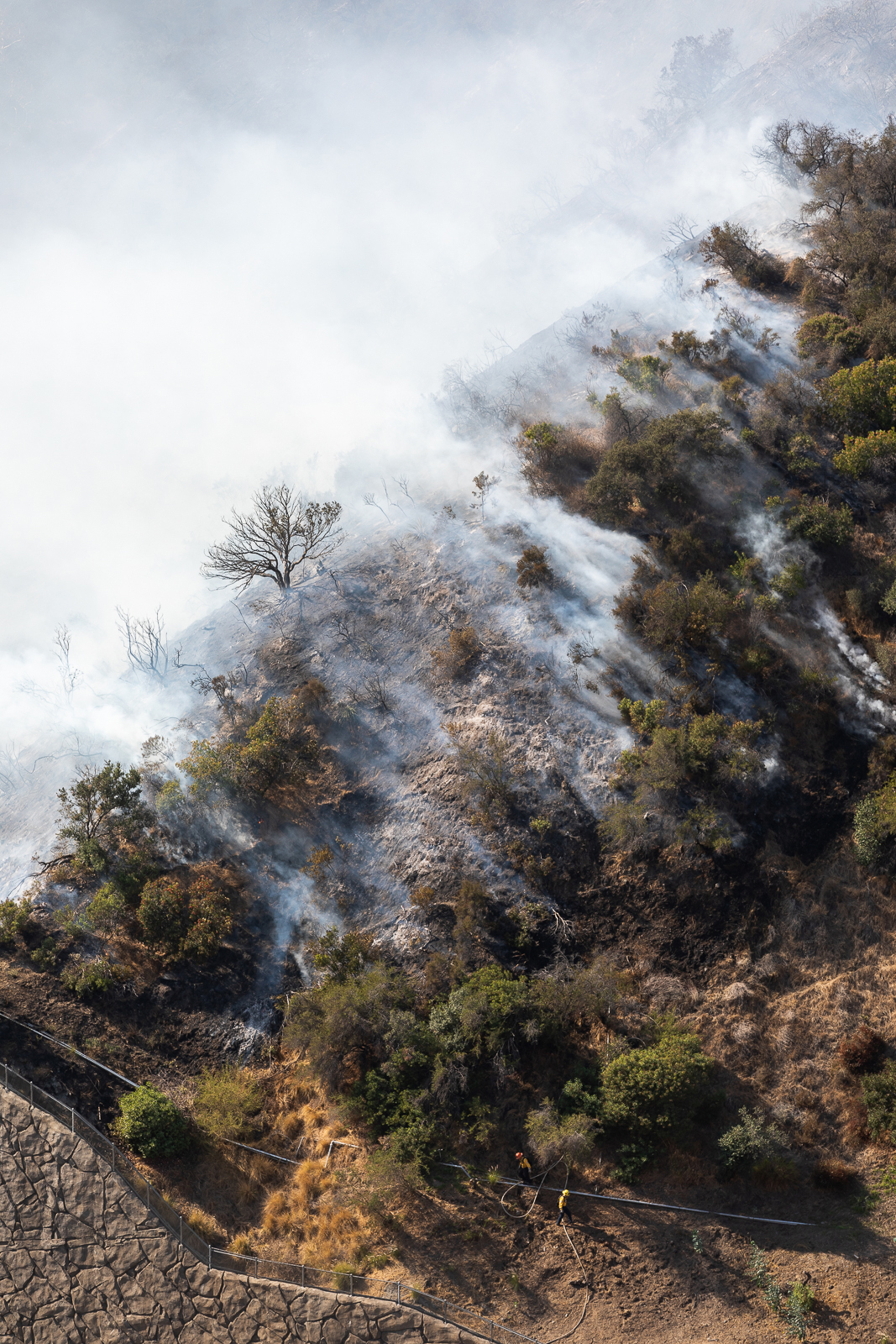UCLA lacks necessary plans for students with disabilities in event of wildfires

The vague nature of UCLA’s current evacuation plans in the event that the yearly wildfires reach campus will prove harmful to and threaten the safety of students, especially disabled students, if they aren’t accounted for. (Tanmay Shankar/Assistant Photo editor)

By Andrew Raychawdhuri
Nov. 14, 2019 10:34 p.m.
It is no secret that fire season in California is well underway.
And just like for midterm season, UCLA students are not as prepared as they should be. But in this case, it’s not their fault.
As the recent Getty fire crept close to campus three weeks ago, students were left wondering what their plans of action would be if the fire came any closer. With a potential evacuation on the horizon, those concerns were heightened for students with disabilities about whether their specific needs and accommodations could still be met.
UCLA’s responsiveness and its seemingly blatant disregard for students affected by the fire have been criticized, and rightfully so. For students living on campus, however, the fire was arguably not close enough to prompt UCLA to provide a full-scale evacuation plan.
But for students with disabilities – whether that be those with severe asthma or those who use wheelchairs – there is no time that is too early to provide a solidified plan.
Recently, UCLA administrators said that there isn’t a concrete evacuation plan for wildfires for students living on campus. Additionally, it was noted that many UCLA faculty and resident assistants – the people who could be in charge of such an evacuation – would not know how to respond in the event of a wildfire threat.
For a world-class research university, planning is not its strong suit.
UCLA needs to create a concrete plan for evacuating its 11,000 students living on campus. But for students with disabilities and other needs on the Hill or in nearby apartments, the university simply creating a plan is not enough. UCLA needs to distribute that plan early on because students with disabilities and others who may have never experienced wildfires remain the most vulnerable in these dangerous situations.
And wildfires won’t be going away anytime soon.
“We haven’t seen anything like this historically. They are definitely becoming a bigger issue and are more dangerous,” said Jon Keeley, an adjunct professor in the department of ecology and evolutionary biology. “We are losing property and lives at a rate that we have not seen in the past.”
Despite this grave reality, students continue to have no idea what to do in the event of a wildfire – and UCLA hasn’t given them much to go on.
The Bruins Safe app lacks a wildfire safety plan, despite having one for other emergency situations such as isolated building fires and earthquakes. If one thing is clear, it’s that UCLA’s wildfire emergency plans are nowhere close to the standard they should be at – in fact, they don’t appear to exist at all.
“This is a whole new thing to me, so I really didn’t have any idea what was happening,” said Karyme Rios, a second-year chemistry student. “UCLA didn’t talk a lot about it after it was over, they just said everything is good, instead of showing students what they can do for the future.”
Clearly, giving students a false sense of security is easier than preparing them for the worst.
And for students with disabilities, the lack of reassurance is tenfold. During wildfires, these populations have all too often been forgotten about – and UCLA seems to be following suit with its negligence.
Rebecca Williams, a second-year geography and environmental studies student with fibromyalgia, said that she felt stressed and scared during the recent Getty fire. Fibromyalgia is a medical condition characterized by chronic widespread pain and a heightened pain response to pressure, so this can make performing certain activities more difficult as there can be a lot of pain involved with even simple tasks.
“I have to put in so much extra thought into every action I take, so for a threat like a wildfire and trying to figure out a plan of action when UCLA hasn’t communicated a plan of action for me, that is a lot more complicated,” Williams said. “You expect your university to back you up and help you with that sort of thing.”
The university begs to differ.
Ricardo Vazquez, a UCLA spokesperson, said in an email statement that there is an evacuation plan and it is effective and feasible for all students, including those with disabilities.
Beyond the clear discrepancies between UCLA’s statements, the alleged plan is virtually pointless if it isn’t readily accessible in times of crisis.
“Students need to understand that whatever they do, they have to do it quickly, because those fires burn at an incredible rate,” Keeley said. “You have to have a plan in place, at least in your mind, of what you would do when a fire ignites.”
But if elevators are down, Center of Accessible Education shuttles are backed up on the Hill, and RAs are woefully underprepared, then students with disabilities will be experiencing more disasters than just an impending wildfire.
“The school praises itself so much on being accessible and equitable and having a diverse student body,” Williams said. “But if they don’t take that diversity into account for everything, how can they say they care about their diverse population?”
It can be argued that UCLA has a lot to think about beyond students with disabilities when it comes to the question of how best to protect students from wildfires. Of course, UCLA needs to first have a larger discussion with the appropriate authorities and make tough decisions on how to protect the general campus population.
But, at the very least, in addition to a better overall plan, UCLA must have a specific plan to help students with disabilities and ensure they are being properly cared for – and that means more than just vague statements at 4:30 a.m.
And even then, those statements don’t resemble anything close to a plan.
Students being unprepared for midterms is one thing, but it pales in comparison to being unprepared for a serious event like a wildfire – but the university doesn’t seem to take these concerns seriously.
And unlike with midterms, in this scenario, it’s clear who’s to blame.

